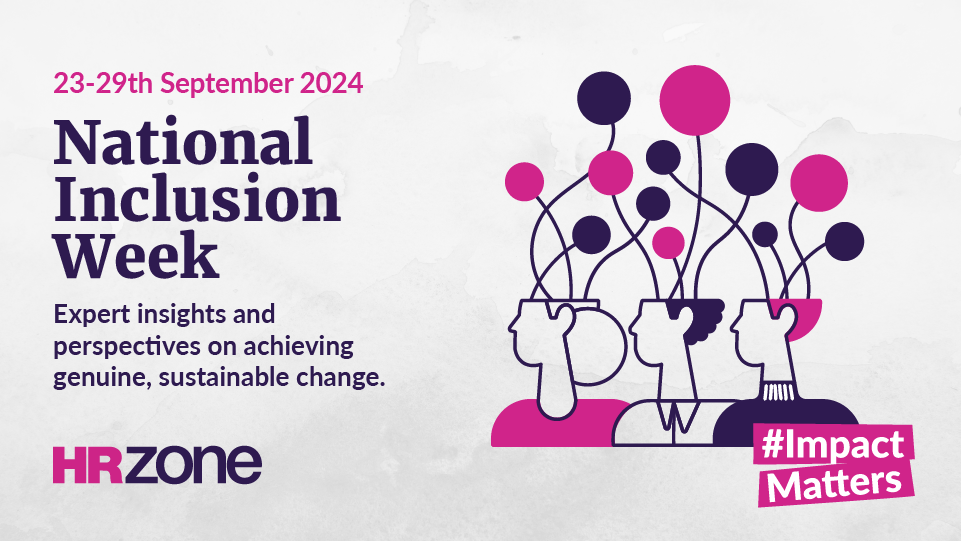This article is part of an HRZone series recognising National Inclusion Week 2024: #ImpactMatters
Inclusion at work is not just a concept but a fundamental pillar for businesses to operate successfully, especially in today’s increasingly diverse and globalised world. It has always been crucial to fostering a positive and equitable working environment. However, organisations are increasingly recognising the impact of inclusion on corporate mental health, productivity, and business success.
This article explores the importance of creating an inclusive work environment, the benefits of doing so and three ways for larger organisations to get started on this inclusion journey.
Understanding inclusion at work
Inclusion is the foundation of a psychologically safe workplace, and is crucial for employees’ mental wellbeing.
Building inclusion at work requires creating a welcoming experience for employees, ensuring they feel valued and their wellbeing feels nurtured. This creates a positive and safe environment, which helps employees feel confident, engaged and productive. What’s more, an inclusive workplace encourages open communication and serves as a safety net where employees feel safe to express their thoughts, concerns, and ideas without fear of judgement.
It’s also important to remember that diversity goes hand in hand with inclusion. Organisations need to work on both components to effectively acknowledge and embrace the unique backgrounds, perspectives and experiences of their workforce. By doing so, employers help reduce any stress and anxiety associated with discrimination and exclusion.
When examining the diverse makeup of an organisation, consider these eight factors:
Benefits of inclusion in large organisations
Inclusion at work is a powerful contributor to employee mental health and organisational success. We’ve summed up three key benefits of creating and building an inclusive workplace.
1. Talent retention
Nearly three-quarters (72%) of employees consider inclusive strategies important when reflecting on their permanence in the organisation, according to a 2022 Workhuman study. This indicates that employees are likelier to stay committed to and grow in work environments where they feel comfortable. It also shows how companies value their employees and are willing to address issues and implement policies related to inclusivity.
This engagement leads to higher productivity and lower talent drain, which helps organisations gain a competitive advantage by reducing the costs associated with employee absenteeism and turnover.
2. Strong corporate reputation
Creating an inclusive workplace not only retains talent but paves the way for top-tier talent to join a company. If someone is looking for a job and comes across a company with strong diversity and inclusion policies, they will be more receptive to applying there as it aligns with their values.
In addition, clients and partners are more likely to collaborate with organisations that demonstrate a commitment to social responsibility. For large organisations, a strong reputation for inclusion supports talent acquisition and opens doors to new business opportunities and markets.
3. Improved mental wellbeing among employees
An inclusive workplace ensures everyone has the same opportunities for growth and development, creating a strong sense of belonging. This is critical in boosting psychological safety, where employees feel comfortable being authentic without fear. As a result, employees experience lower stress and anxiety levels and improved mental wellbeing.
Employee Assistance Programs (EAPs) play a key role in this area. They offer confidential psychological support and provide resources to help prevent and intervene in mental health issues among employees. This can be helpful for those who feel marginalised or excluded. Moreover, EAPs can help strengthen the organisation’s commitment to inclusion by addressing employees’ specific needs and creating a more supportive and responsive work environment.
Remember that diversity goes hand in hand with inclusion.
Three steps to rolling out inclusive initiatives in the workplace
Inclusive environments are not built overnight. To foster a positive work environment, start by measuring the present context to identify critical areas of improvement. In this initial phase, we recommend taking the following three steps:
1. Organisational culture assessment surveys
This type of survey can provide valuable information about employees’ perceptions and experiences of inclusion in the organisation. These assessments also help identify strengths and areas for improvement within the cultural dynamic. Make sure you treat all employee data and feedback anonymously.
2. Focus group sessions or individual interviews
These activities provide a safe space for employees to share their experiences, perceptions and suggestions on inclusion and diversity in the workplace. They are an effective way of gathering detailed information and different perspectives. Such sessions will help you gain a deeper understanding of employees’ experiences, identify perceived barriers, and develop future initiatives and policies concerning inclusion at work.
3. Review of existing policies
Review existing policies and practices to ensure inclusion and equity. Bias in the recruitment process, performance reviews, and career development programmes should also be tackled at this stage.
Inclusive environments are not built overnight.
Unlocking inclusivity through mental wellbeing solutions
Strong policies can prevent problems related to inclusivity from arising. This strategic approach boosts employee wellbeing, which is key to organisational success.
For HR managers in large organisations, implementing tailored mental wellbeing solutions with the expertise of occupational health psychologists is invaluable when executing inclusive initiatives. This way, HR leaders can more effectively assess organisational culture, address biases and ensure that inclusion is deeply embedded in every policy and practice.
Unlock a healthier, more productive workplace with our expert-designed mental wellbeing solution for large organisations.
Ifeel offers personalised, data-driven guidance for HR managers and comprehensive 360° support for employees, tailored to their unique needs. See the difference a strategic approach to mental well-being can make for your organisation.
If you would like more information about our mental wellbeing solution for companies, simply request it, and we will contact your team as soon as possible.








